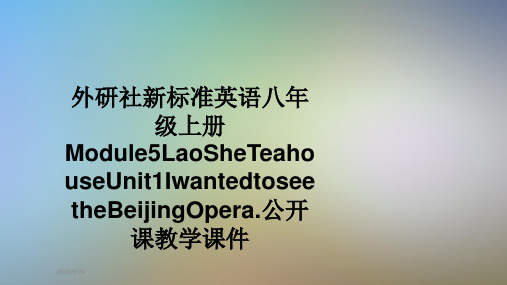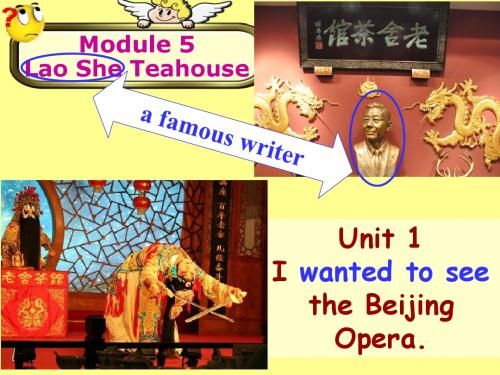外研版八年级Module5Laoshe'sTeahouseUnit1
- 格式:ppt
- 大小:4.26 MB
- 文档页数:38





Module 5 Lao She Teahouse一、学习目标:A. 单词和短语:actress, teahouse, offer, end, in the end, no idea, act, show, common, describe, society, head teacher, college, novel, if, magicB. 交际用语:1. How was it?2. You know, …3. That’s the main thing.4. No idea.5. — Do you want to see the Beijing opera?—Yes, I’d love to.6. — Do you want to come to Lao She Teahouse with me?—Yes, please. I’d like to go with you.7. I wanted to see the Beijing Opera.8. Lingling offered to take me there.9. We only planned to watch for an hour.10. We decided to stay for three hours.11. I hope to understand more next time.12. — I want to see the Beijing Opera.—Why don’t we …?二、教学目标1. Function: Talking about intentions and plans.2. Structure: Infinitive structures (1): infinitives as objects; verbs followed by infinitives.3. Skills:1) Listening and understanding familiar topics (Beijing Opera)finding specific information.2) Describing intentions and plans in simple language.3) Reading and understanding the sequence of events.4) Writing a short passage about favourite play or film.4. Around the world: Theatres5. Task: Acting out a scene from a play.三、重点及难点:Infinitive structures (1): infinitives as objects; verbs followed by infinitives.四、教学设计:Unit 1 I wanted to see the Beijing Opera.ⅠTeaching modelListening and speakingⅡTeaching methodPWP approachⅢ Teaching aims1. Key vocabulary: actress, teahouse, offer, end, in the end, noidea2. Key structures: Infinitive structures (1): infinitives as objects; verbs followed by infinitives.3. Key sentences:1) How was it?2) You know, …3) That’s the main thing.4) No idea.5) — Do you want to see the Beijing opera?—Yes, I’d love to.6) — Do you want to come to Lao She Teahouse with me?— Yes, pl ease. I’d like to go with you.7) I wanted to see the Beijing Opera.8) Lingling offered to take me there.Ⅳ Teaching aidsTape recorder, OHP, videoⅤTeaching StepsStep 1 Warming-up1. Enjoy a play: Beijing Opera.2. Show some pictures.3. Introduce the new words.4. Learn the new words.5. Read the new words.6. Look at the pictures, and talk something about the pictures. Step 2 Work in pairs.1. Ask the students to read the words in the box in Activity 1.2. Look at the pictures in Activity 1, and talk about them.3. Work in pairs. Use the words from the box to help you.Step 3 Listening practice.1. Ask the students to read through the sentences in Activity2.1) Betty often sees / wants to see some traditional Beijing opera.2) Betty knows / doesn’t know Lao She Teahouse.3) Lingling says that the opera is easy / difficult to understand.2. Play the recording once without stopping.3. Listen and underline the correct words.4. Play the recording again and ask the whole class to check witha partner.5. Check the answers:Keys: 1. wants to see 2. doesn’t know 3. difficultStep 4 Listen and read.1. Show some pictures, and ask the students to talk about them.2. Ask the students to read the conversation silently.3. Play the recording and ask the students to listen and read the conversation.4. Read the conversation.5. Act it out.6. Learn “Everyday English”1) How was it?2) You know, …3) That’s the main thing.4) No idea.Step 5 Check the true sentences.1. Ask the students to read the conversation again.2. Now check the true sentences.1) Tony went to Lao She Teahouse with Betty and Lingling.2) Betty understood the opera.3) Lingling and Betty stayed longer than they planned.4) Betty enjoyed the opera.5) Betty would like to go to the opera again.6) Betty knew about Lao She before she went to the teahouse.3. Ask the students to check with a partner.4. Check the answers:Keys: 1. × 2. × 3. √ 4. √ 5. √ 6. ×Step 6 Complete the passage.1. Ask the students to read the words in the box in Activity 4.2. Read through the passage.Betty wanted to see the Beijing opera, so Lingling (1) ________ to take Betty to Lao She Teahouse. The words of the opera were (2) ________ to understand, but the actors and (3)__________ were excellent. They only planned to watch for an hour, but in the (4) ________, they stayed for three hours. Betty thought it was interesting — that was the (5) ________ thing!3. Complete the passage with the correct form of the words from the box.4. Ask the students to check with a partner.5. Check the answers:Keys: 1. offered 2. difficult 3. actresses 4. end 5. mainStep 7 Listen and repeat.1. Play the recording once without stopping.2. Play the recording again and ask the whole class to repeat.1) — Do you want to see the Beijing opera?—Yes, I’d love to.2) — Do you want to come to Lao She Teahouse with me?—Yes, please. I’d like to go with you.3. Ask the students to listen and mark the intonation.4. Now listen again and repeat.Step 8 Work in pairs.1. Ask the students to read the conversations in Activity 5 aloud.2. Make true sentences.1) I want to ___________ next week.2) They offered to ___________.3) I hope to ___________ one day.4) My parents agree to ____________ on Saturday.3. Talk about something you’d like to do or see.— I want to go to Xinjiang and ride horses.—…Step 9 Language points1. — Who is Lao She? 老舍是谁?— No idea. 不知道。

外研版英语八年级上册Module 5《Lao She’s Teahouse》(Unit 1)教学设计一. 教材分析《Lao She’s Teahouse》是人教版初中英语八年级上册Module 5的教学内容。
本节课主要介绍老舍的著作《茶馆》,通过学习这篇课文,学生可以了解到中国近代史上不同阶层的人物的生活状态,以及他们对待生活的态度。
教材内容丰富,涉及词汇、语法、阅读理解等多个方面,有利于提高学生的综合语言运用能力。
二. 学情分析初中八年级的学生已经具备了一定的英语基础,能够运用英语进行简单的交流。
但他们在阅读理解、词汇积累以及语法运用方面还存在一定的困难。
因此,在教学过程中,需要关注学生的个体差异,合理安排教学内容,调动学生的学习积极性,提高他们的阅读理解能力和语言运用能力。
三. 教学目标1.知识目标:学生能够掌握本节课的重点词汇和短语,如“drama, character, actor, actress, modern”等;学生能够理解课文内容,了解《茶馆》的故事背景和人物关系;学生能够运用所学的词汇和语法知识,进行简单的阅读理解和口语表达。
2.能力目标:学生能够提高阅读理解能力,通过阅读课文,获取和处理信息;学生能够在日常生活中运用所学的英语知识进行交流。
3.情感目标:学生能够培养对英语学习的兴趣,增强自信心;学生能够理解课文中所反映的社会现象,培养正确的人生观和价值观。
四. 教学重难点课文内容的理解;重点词汇和短语的掌握;运用所学的词汇和语法知识进行阅读理解和口语表达。
课文中长难句的理解;词汇的灵活运用;语法知识的运用。
五. 教学方法1.任务型教学法:通过设置各种任务,让学生在完成任务的过程中,运用所学知识,提高语言运用能力;2.情境教学法:创设各种情境,让学生在真实的语境中学习英语,提高学习兴趣;3.小组合作学习:鼓励学生相互合作,共同完成学习任务,培养团队精神;4.反馈与评价:及时给予学生反馈,鼓励他们积极参与学习,提高自信心。
外研版英语八年级上册Module 5《Lao She’s Teahouse》(Unit 1)说课稿一. 教材分析《Lao She’s Teahouse》(Unit 1)是外研版英语八年级上册Module 5的一篇阅读课文。
本节课文主要介绍了老舍的《茶馆》,通过讲述茶馆里的人物和故事,展示了老北京的历史文化。
课文内容丰富,语言生动,充满了烟火气。
本节课主要围绕茶馆里的三位角色——王利发、常四爷和秦仲义展开,通过他们的对话和独白,揭示了各自的性格特点以及他们所代表的社会阶层。
二. 学情分析八年级的学生已经具备了一定的英语基础,能够理解和运用简单的英语进行交流。
但他们在阅读长篇文章时,可能会遇到一些生词和短语的理解困难,因此需要在教学过程中加以引导和帮助。
此外,学生对于老北京的历史文化可能了解不多,需要在课前进行相关背景知识的介绍。
三. 说教学目标1.知识目标:学生能够掌握课文中的生词和短语,理解课文大意,把握人物性格特点。
2.能力目标:学生能够运用所学知识进行口语交流,提高阅读理解能力。
3.情感目标:通过学习课文,学生能够了解老北京的历史文化,增强对祖国文化的自豪感。
四. 说教学重难点1.教学重点:课文生词和短语的学习,阅读理解能力的提高。
2.教学难点:人物性格特点的把握,对老北京历史文化的理解。
五. 说教学方法与手段1.教学方法:采用任务型教学法,让学生在完成任务的过程中,提高英语运用能力。
2.教学手段:利用多媒体课件、图片等辅助教学,激发学生学习兴趣。
六. 说教学过程1.导入:教师通过展示老北京的图片,引导学生谈论自己对北京的了解,为新课的学习营造氛围。
2.读前预测:教师引导学生根据课文标题和图片,预测课文内容。
3.自主学习:学生自主阅读课文,遇到生词和短语时,可以查阅词典或与同桌讨论。
4.合作学习:学生分组讨论,分析课文人物性格特点,总结各自的代表意义。
5.课堂展示:各小组代表向全班同学展示讨论成果,其他同学可进行补充和评价。
外研版八年级上册Module 5 Lao She Teahouse Unit 1(第2课时)全知识点同步练习(含答案)Unit 1 第2课时同步练习I.根据句意,填入适当的词1.There will be opera at the party this evening.2.My grandma watches TV about an hour every day.3.—is Jackie Chan—Oh, he is a famous actor.4.—was the film last night, Lingling—It was a bit boring. I almost slept.5.I wanted to have time to play basketball, I tried to finish my homework quickly.II.用方框中所给短语的适当形式完成句子no idea, next time, be famous for, the main thing, in the end6.Daming trained hard for the match and he won it.7.Hangzhou the West Lake.8.—What time is the party tonight—Sorry, I have .9.Maybe you’ll have better luck .10.—The music can make me feel relaxed.—That’s .III.用所给单词的适当形式填空11.It is difficult for me (remember) the words.12.I want (be) a doctor like my father.13.My parents agreed (take) me to the zoo last Sunday.14.Mark Twain is a famous American (write).15.The police told the boys (not play) in the street. Because it was dangerous.16.He (drink) some water and then went on working.17.Her sister is young, but she (especial) likes the Beijing Opera.18.There are several famous (actress) from Zhejiang, such as Zhou Xun.Ⅳ.单项填空()19.—was the football match yesterday—Pretty exciting.A.WhatB.WhenC.WhyD.How()20.When I was young, my grandfather often me the People’s Park.A.took; toB.took; forC.brought; forD.sent; at()21.—I think English is hard to learn.—. Just keep learning it, and you’ll find it easy.A.That’s the main thingB.It’s impossibleC.I can’t agree with youD.That’s too bad()o She is famous his great plays a writer.A.as; forB.for; asC.as; asD.for; for()23.The woman found her lost dog by the river .A.by the endB.in the endC.at the end ofD.by the end ofⅣ.完形填空When I was in primary school, I fell in love with reading. The books 24 me to a wonderful world. The more I read, the 25I wanted to know. However, my parents 26buy so many books for me to read. So, I had to solve the problem myself.There was a bookshop near my home. One day I walked into 27 shop and picked up a book. I didn’t know whether(是否) I could read there 28buying any books. 29I wasn’t noticed, I just read a few pages and then put it back on the shelf quickly. 30, no one noticed me on that day. So, I was not so nervous any more. From that day on, I went there to read every day after school and 31 happened. I felt relaxed day by day and continued reading there.But one day, while I was reading, the owner came up and asked, “You like reading 〞I looked down and answered in a 32voice, “Yes.〞“Don’t worry,〞he said with a smile. “You may read books here every day 33you help me clean the shop.〞I felt quite 34, “Really It’s so nice of you!〞I was very happy that I could read there. From then on, I spent only a little time 35the shop and most time reading every day. 36this way, I read lots of books, and I became one of the 37writers in our school. I even won some prizes in writing. Now studying in high school, I can 38books from the library. My hobby of reading will be kept forever. It surely makes a big difference to my life.()24.A.brought B.bought C.lent D.taught()25.A.less B.fewer C.more D.worse()26.A.couldn’t B.needn’t C.mustn’t D.hadn’t()27.A.a B./ C.the D.my()28.A.with B.for C.like D.without()29.A.To make sure B.To believeC.To believe inD.To worry about()30.A.Unluckily B.Naturally C.Suddenly D.Luckily()31.A.something B.nothing C.anything D.everything()32.A.high B.angry C.happy D.low()33.A.if B.before C.after D.because()34.A.worried B.interested C.surprised D.tired()35.A.cleaning B.watching C.buying D.helping()36.A.In B.On C.At D.To()37.A.tallest B.best C.healthiest D.quietest()38.A.lend B.take C.send D.borrowⅣ.阅读理解Book: Look Out, Cub! Writer: Peter Bently Language: English Number of pages: 20 Age: 3~7 years old Story: Cub, a little lion, wants to go out and play. However, everyone is too busy. So Cub decides to go out himself. Cub wants to know what it would be like to see as far as the birds, so he climbs up a tall tree. Unluckily, he climbs too high and becomes stuck(卡住的). All alone, he calls for help. His mum comes and saves him.About the writer: Peter Bently was born in 1960 in England. He grew up in many places in England and foreign countries like Germany, Singapore and China. Now, he lives in Devon, England with his wife Lucy, son Theo and daughter Tara.From the readers: Greg: My three-year-old son loves this book. The story itself isn’t that great, but the pictures are big and beautiful. Abby: This is a little book for kids, especially for those who are interested in lions. My daughter loves it very much.()39.Look out, Cub! tells a story about a little .A.lionB.tigerC.monkeyD.giraffe()40.Cub decides to go out himself because everyone is much too .A.tiredB.boredC.angryD.busy()41.Peter Bently is from .A.GermanyB.EnglandC.ChinaD.Singapore()42.There are people in Peter Bently’s family according to the passage.A.twoB.threeC.fourD.five()43.From the passage, we can learn that .A.the book is for the old peopleB.Peter Bently wrote the book in ChineseC.Abby’s daughter loves the bookD.Greg’s son doesn’t like the pictures in the book答案I 1.an2.for3.What4.How5.soII. 6.in the end7.is famous for8.no idea 9.next time10.the main thingIII.11.to remember12.to be13.to take14.writer15.not to play16.drank17.especially18.actressesⅣ.19.D20.A考查固定短语的用法。